Best small electric cars 2025: Top 11 affordable compact EVs to buy now
Compact EVs are cheaper to run, but that doesn’t mean they sacrifice on practicality on comfort. We’re rounding up the top-rated small electric cars
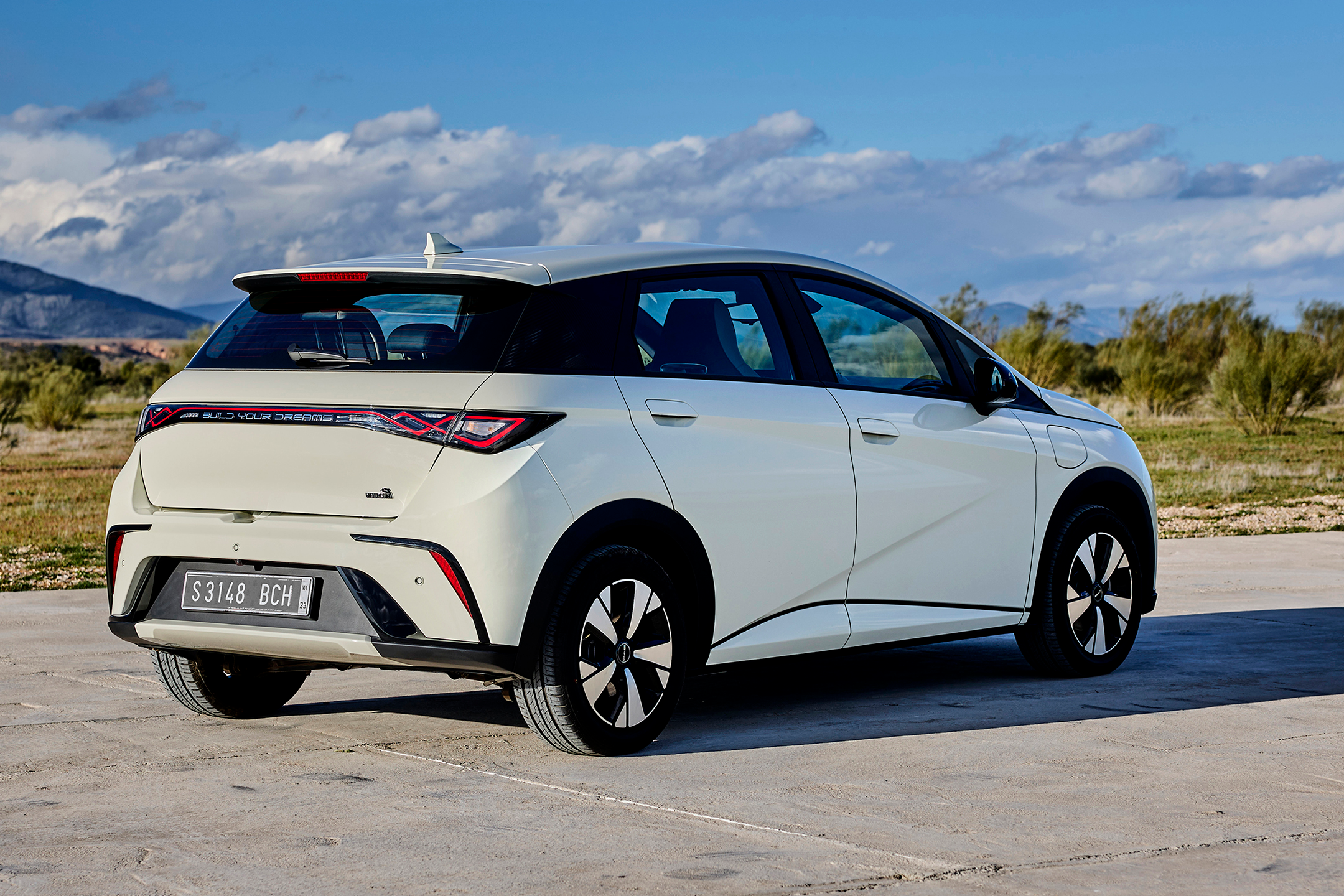
The best small electric cars today are punching above their weight in terms of value and capability. You can get behind the wheel of a fully electric city car for under £15,000, and a host of feature-rich small EVs with relatively impressive range are available for well under £30,000.
Forget the sprawling SUVs; there's a wealth of choice in affordable, small EVs. In the £30k arena we have the stylish Volvo EX30 and the reliable Ford Puma Gen-E. But you can spend even less with ultra-affordable options like the Dacia Spring (starting at a remarkably low £14,995 – a bargain for any new car, especially an EV). No matter your budget, there's a small electric car to meet your needs.
Our list also features the playful Abarth 500e and the surprisingly compact Jeep Avenger, which packs rugged SUV styling into a smaller footprint, sharing its platform with other well-regarded EVs like the Vauxhall Mokka.
While these smaller EVs may have shorter ranges than their larger counterparts due to their battery size, many still deliver over 200 miles on a single charge, and their smaller batteries mean quicker charging times and lower running costs. Keep reading to explore our top 10 picks for the best small electric cars on the market.
How we tested
Every car featured in this article has been driven extensively and reviewed by The Independent before its inclusion in the top 10 is considered. We test electric cars in real-world situations, including car parks and charging stations, as well as in town and city streets, country lanes, A-roads and motorways throughout the UK, and often across Europe and around the world.
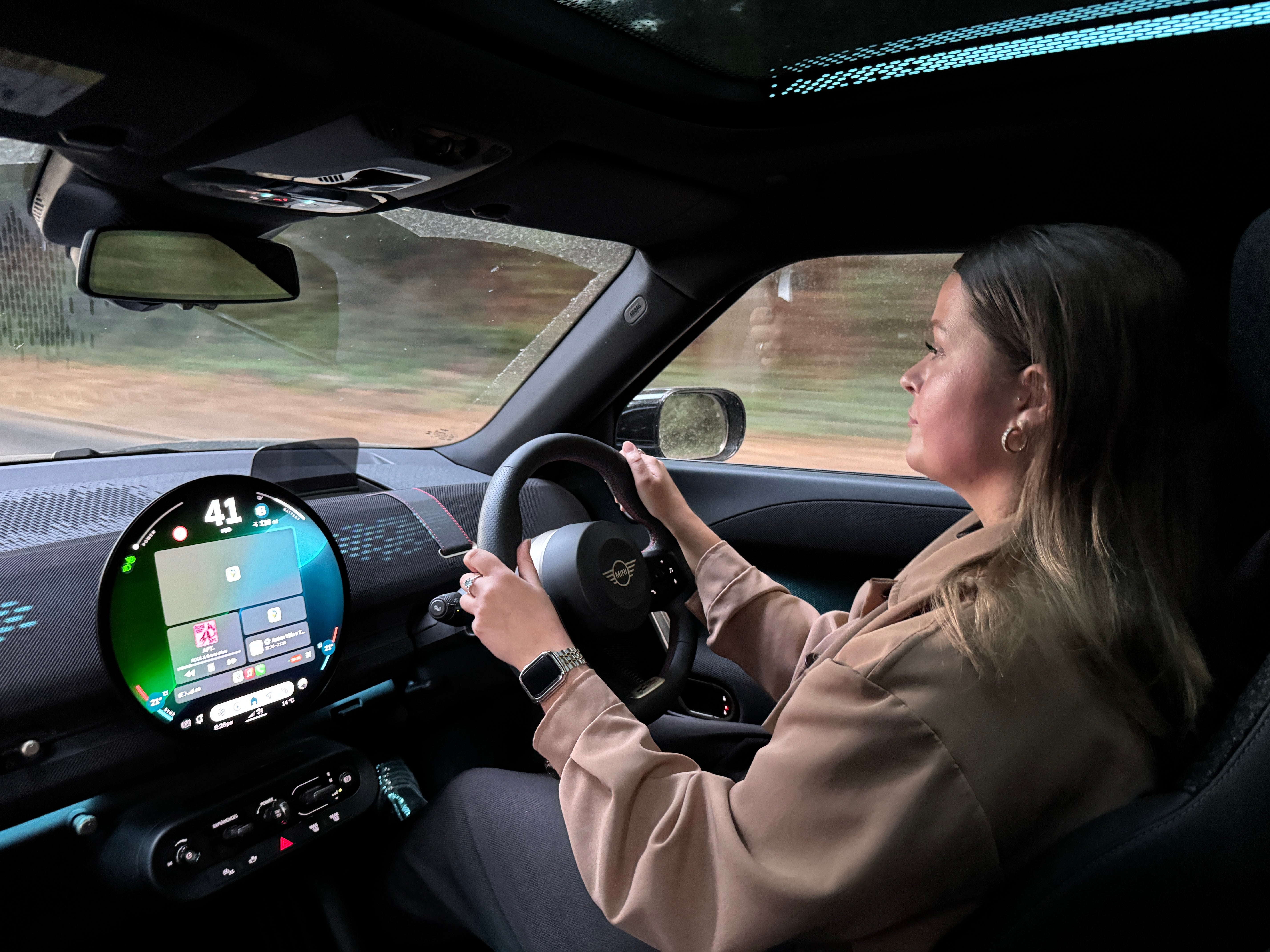
To pick the best small EVs we considered their size, of course, but also their value for money, how they drive and what key features they have. This includes their battery size and range, but also their efficiency and how quickly they charge, plus an assessment of must-have features like smartphone connectivity and semi-autonomous driving technology.
The best small EV isn’t necessarily the smallest or even the most affordable. We consider a range of factors that, when combined, can elevate a car above its rivals.
The best small electric cars 2025
- Best for range – Volvo EX30: From £35,560, Volvocars.com
- Best for value – Dacia Spring: From £14,995, Dacia.co.uk
- Best for boot space – Ford Puma Gen-E: From £26,245, Ford.co.uk
- Best for style – Mini Cooper SE: From £29,905, Mini.co.uk
- Best for families – Citroen e-C3: From £22,095, Citroen.co.uk
- Best for fun – Abarth 500e: From £29,985, Abarthcars.co.uk
- Best for kit – BYD Dolphin: From £30,205, BYD.com
1. Volvo EX30: From £35,560, Volvocars.com
Best: For range
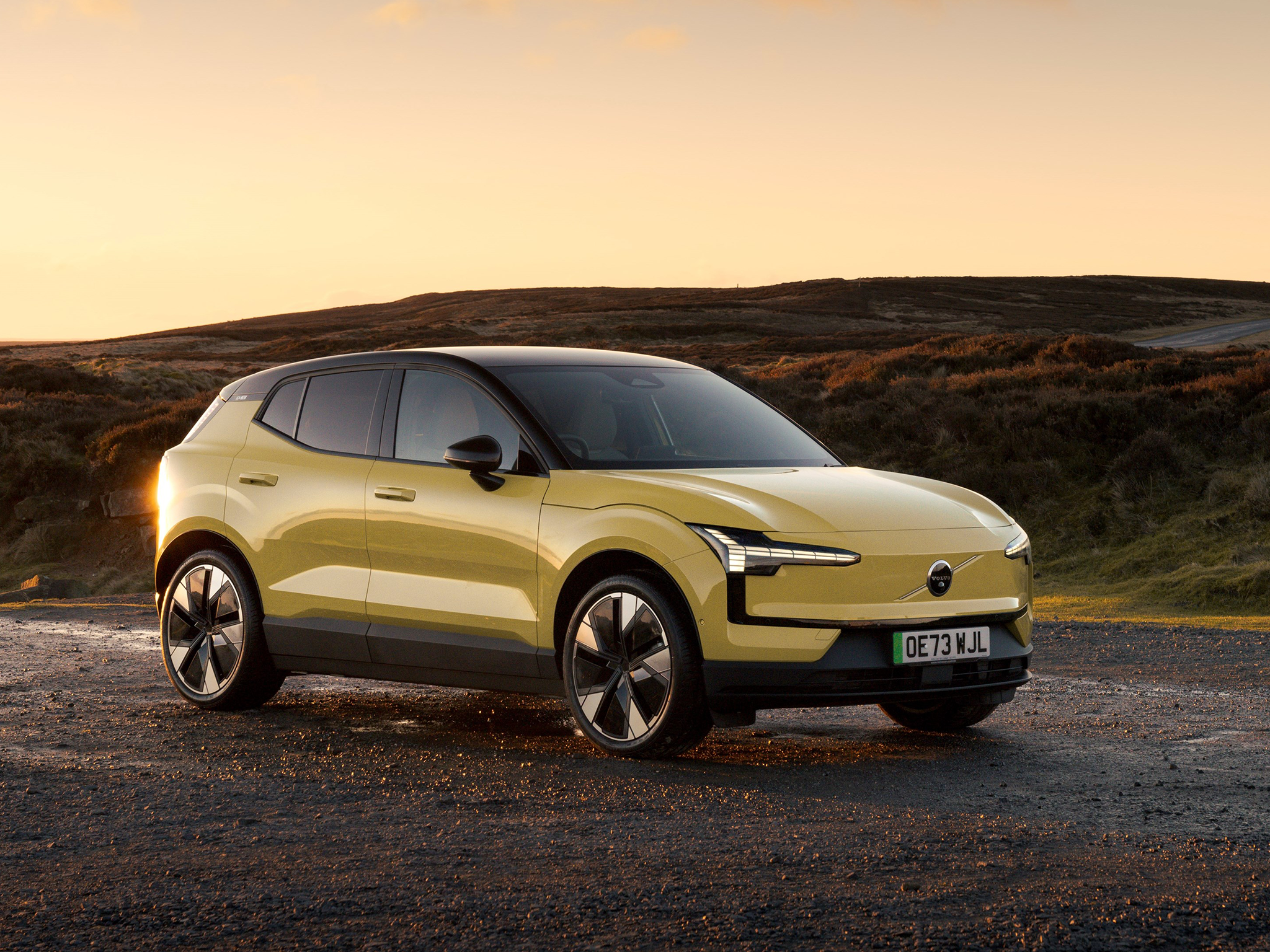
Independent rating: 7/10
- Pros: Premium design, strong performance, good value
- Cons: Touchscreen frustrations, limited rear space, short range of smaller battery
Volvo EX30 specs
- Dimensions: 4,233mm x 1,838mm x 1,550mm
- Price range: £35,560 to £42,350
- Battery size: 51 kWh or 69 kWh
- Maximum claimed range: 296 miles
- Miles per kWh (claimed): 3.68
- Maximum charging rate: 158kW
The Volvo EX30 is a stylish EV that proves small electric cars can still offer a great range. In this case the little Volvo has a maximum range of almost 300 miles when bought with the larger of two battery options.
Although small by Volvo standards, the EX30 is still big enough to work as a young family’s only car, and it benefits from fast charging, a premium design inside and out, and good performance even in the base model. It drives well and is properly quick if you splash out on the dual-motor version.
Read our full Volvo EX30 review
The five-seat cabin is minimal in its design, but makes good use of recycled materials to keep things interesting. Volvo has clearly spent an admittedly tight budget in the right places to keep the EX30 feeling premium. Clever storage, frameless mirrors and nicely sculpted door handles all elevate the ownership experience, but the lack of a driver display takes a bit of getting used to, since the speedometer (and the car’s entire user interface) is on the central touchscreen.
That said, the Android Automotive system works better than most, and there’s always Apple CarPlay integration if you prefer. The EX30 is an impressive small EV that offers plenty of range and the trappings of a premium badge at a competitive price.
2. Dacia Spring: From £14,995, Dacia.co.uk
Best: For value
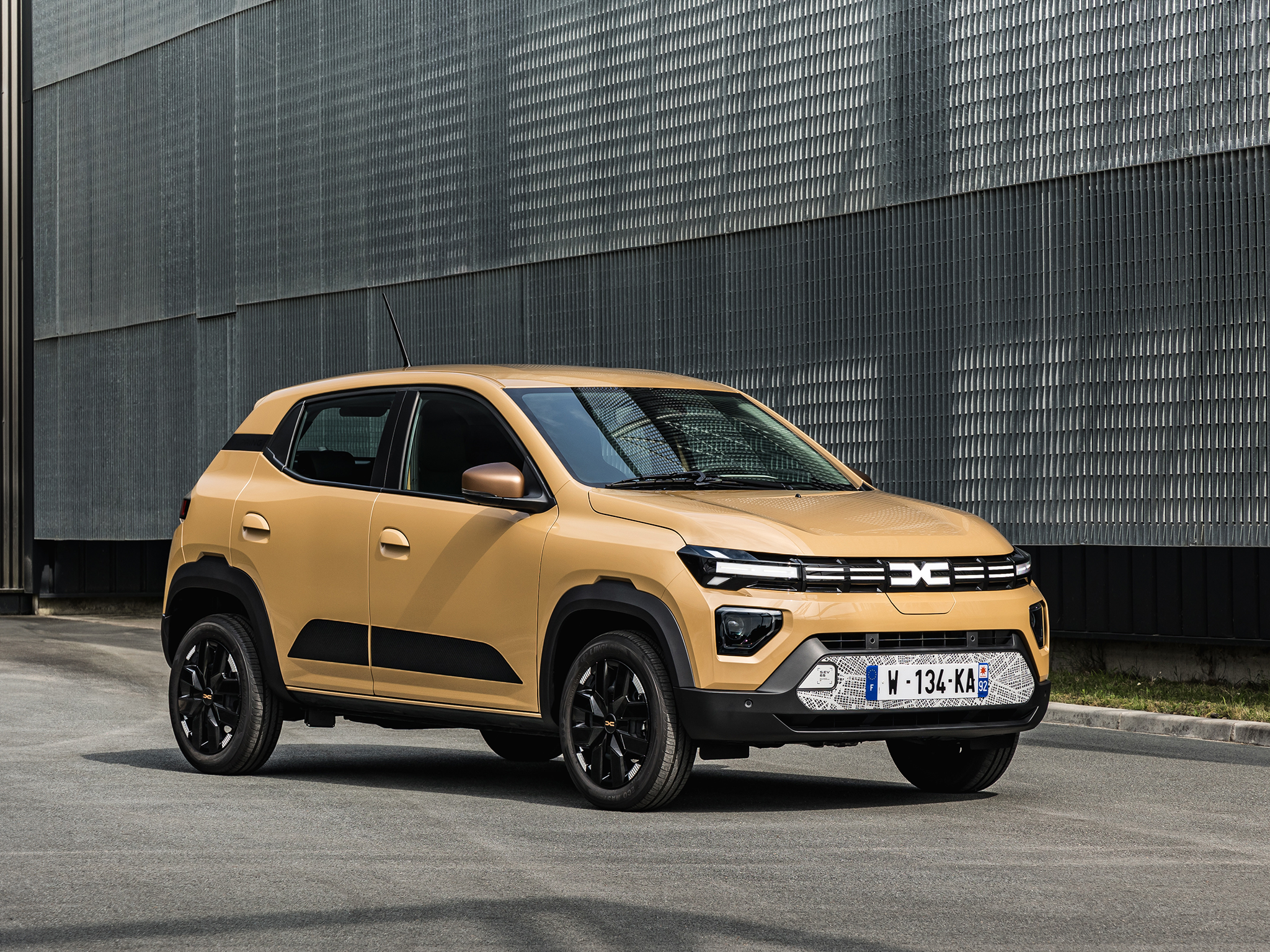
Independent rating: 8/10
- Pros: Low price, clever warranty
- Cons: Slow, restrictive range, small cabin
Dacia Spring specs
- Dimensions: 3,701mm x 1,583mm x 1,519mm
- Price range: £14,995 to £16,995
- Battery size: 26.8 kWh
- Maximum claimed range: 140 miles
- Miles per kWh(claimed): 4.4
- Maximum charging rate: 30 kW
The Dacia Spring isn’t just good value for an EV. It’s one of the cheapest new cars on sale, period. And since it’s already proven to be a smash hit in Europe, there’s no reason to think the Spring won’t do very well in the UK too.
The small battery and slow charge rate means the Spring isn’t a car well-suited to long journeys, but for a town centre runabout it could be the perfect EV for a lot of people. Charge at home – or even top it up using solar power – and the Spring will give you very cheap local motoring, whether it’s the school run, the weekly shop or as a commuter car to get you to the train station.
Read our full Dacia Spring review
Although not massive, the Spring has enough space for two adults and two children, plus the boot is big enough for a week’s worth of groceries. You shouldn’t expect plush materials in the cabin, or any extra safety tech beyond what is legally required, but there’s still a helpful amount of tech on board, especially if you go for a higher trim level. Renault-owned Dacia provides a seven-year warranty on cars services at its own dealerships.
In a world that has quickly become accustomed to spending at least £30,000 on even a small EV, the Dacia Spring offers fantastic value for money.
3. Ford Puma Gen-E: From £26,245, Ford.co.uk
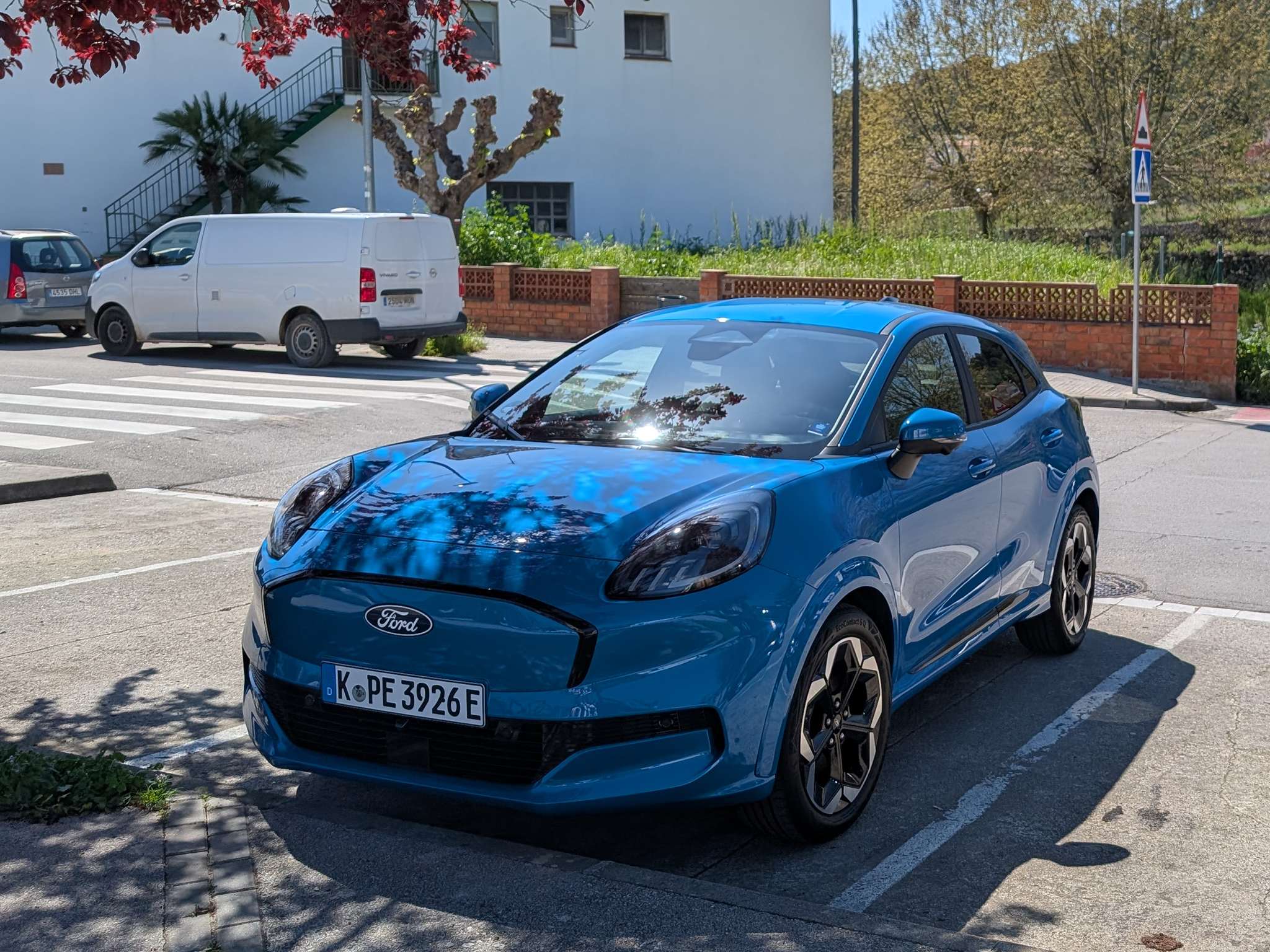
Best: For boot space
Independent rating: 7/10
- Pros: Loads of storage, decent standard tech, composed handling
- Cons: Modest range, only one battery option
Ford Puma Gen-E specs
- Dimensions: 4214mm x 1930mm x 1555mm
- Price range: £26,245 to £31,995
- Battery size: 43kWh
- Maximum claimed range: 233 miles
- Miles per kWh: Up to 4.7
- Maximum charging rate: 100kW
Ford entered the competitive small electric SUV market in 2025 by electrifying its UK best-seller, the Puma. The Puma Gen-E successfully retains the core appeal of its petrol sibling with engaging handling and impressive 523 litre boot capacity thanks to the so-called ‘GigaBox’ underfloor storage– a major advantage for families needing space. Standard equipment is decent, featuring large screens with wireless smartphone integration, and its sub-£30k starting price is competitive, further enhanced by Ford’s appealing ‘Power Promise’ package which offers a free home charger, charging credits and more.
Read our full Ford Puma Gen-E review
To retain the Puma’s shape and character, Ford has had to compromise on the battery size. The modest 43kWh capacity translates to a real-world figure often below 200 miles, trailing even cheaper rivals that offer 250-300 miles. It’s efficient however (expect up to 4.7 mi/kWh), and the limited range makes it best suited for urban duties or shorter commutes rather than regular long journeys. It’s a competent electric conversion of a popular car, especially strong on practicality and fun, and while it’s ideal for most Puma fans its range limitations place it behind the curve compared to the best purpose-built small EVs.
4. Mini Cooper SE: From £29,905, Mini.co.uk
Best: For style
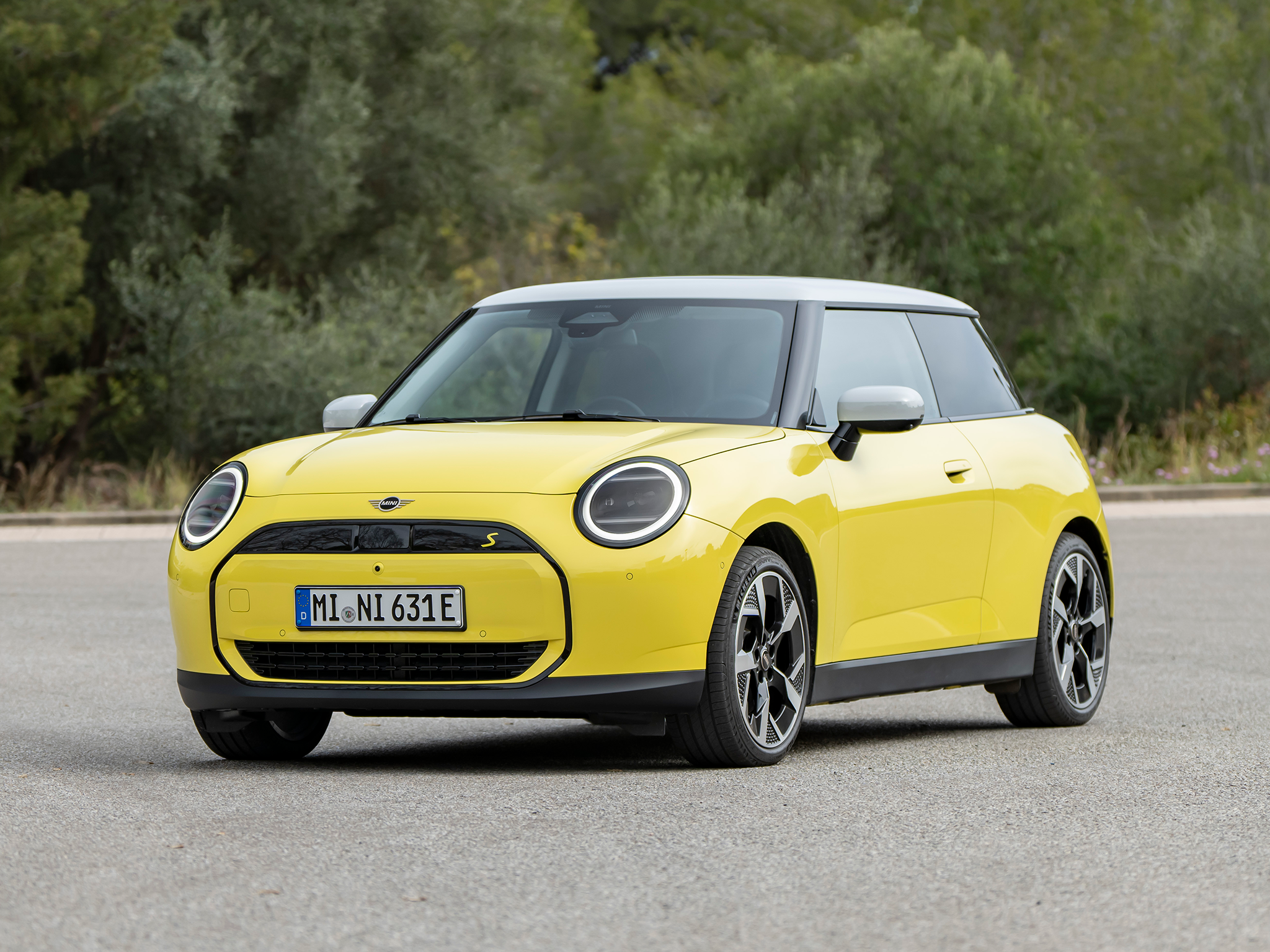
Independent rating: 7/10
- Pros: Fun to drive, revamped interior, attractive OLED touchscreen
- Cons: Limited range in Cooper E guise, slow charging, steep software learning curve
Mini Cooper SE specs
- Dimensions: 3,858mm x 1,928mm x 1,460mm
- Price range: £29,905 to £34,500
- Battery size: 36.6 kWh or 49.2 kWh
- Maximum claimed range: 182 to 249 miles
- Miles per kWh (claimed): 4.2 to 4.4
- Maximum charging rate: 75 to 95 kW
Ever since the British brand was relaunched by BMW at the start of the century, the Mini Cooper has been known for providing style and fun in a compact package at a premium price. That same recipe holds true for the latest model, which starts at £30,000 but packs a high-quality interior that’s more spacious than ever (despite the car being no larger than its predecessor), and with a healthy dose of high-end tech.
Nowhere is this more apparent than with the all-new infotainment system, which runs on a striking, circular OLED touchscreen in the centre of the dashboard. The user interface has a fairly steep learning curve, but persevere and you’ll soon enjoy the characterful little Cooper.
Read our full Mini Cooper SE review
The new electric Mini is as fun to drive as ever, with extra performance if you pay for the pricier Cooper SE, and an improved range of up to 249 miles. All that fun comes at a cost though, as the ride is quite firm, the rear seats are still best reserved for children on longer journeys, and at just 75 kW the charge rate of the entry-level Cooper E isn’t what it should be, especially given the price. That said, if you understand the Cooper’s limits when it comes to range and charge speed, this is a seriously fun EV that’s loaded with character.
5. Citroen e-C3: From £22,095, Citroen.co.uk
Best: For families
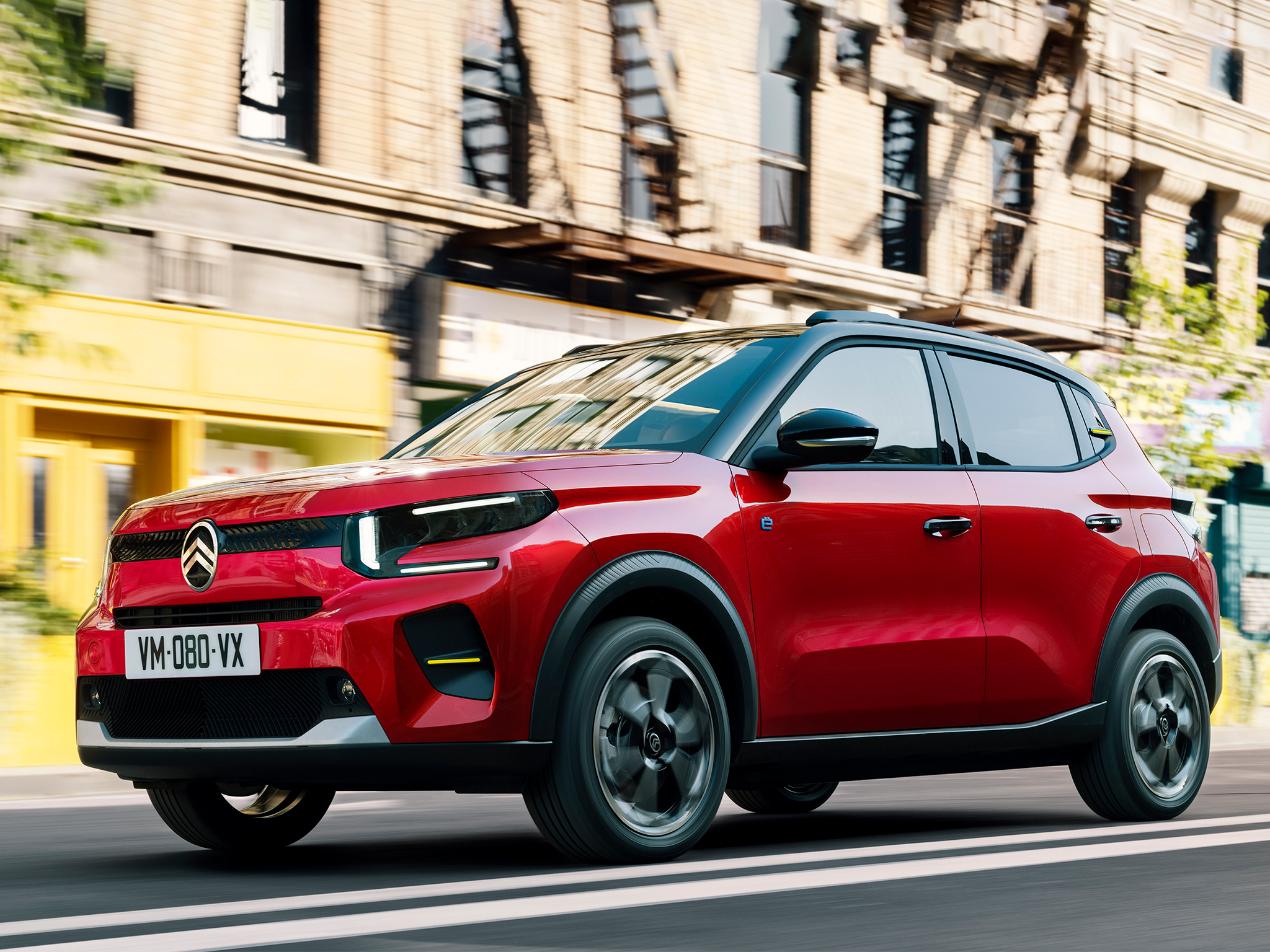
Independent rating: 8/10
- Pros: Value for money, cabin space
- Cons: Iffy cabin plastics
Citroen e-C3 specs
- Dimensions: 4,015mm x 1,755mm x 1,577mm
- Price range: £21,990 to £23,690
- Battery size: 45 kWh
- Maximum claimed range: 199 miles
- Miles per kWh (claimed): 3.6
- Maximum charging rate: 100kW
The Citroen e-C3 stands for everything we like about small, affordable cars. Not only is it a relatively cheap EV, but that affordability comes without any obvious trade-offs. It’s just a sensible, practical and comfortable small car that just so happens to be electric, and is terrific value all at the same time.
Only the incredibly low price of the Dacia Spring can undercut the Citroen. And for that extra cash – but remember, it’s still comfortably under £25,000 – you get more range, much quicker charging (quicker than a Mini Cooper), and a roomy cabin.
Read our full Citroen e-C3 review
We found the e-C3 to be really comfortable around town, yet quick enough when required. And while the interior materials aren’t particularly luxurious, there’s enough space for four adults – more so than the smaller Dacia – and a decent boot, too.
Citroen has sensibly kept the e-C3 lineup nice and simple, with just two options to consider. Our pick would be the more modest Plus specification, which comes with all the kit you’d need yet costs just under £22,000. That represents fantastic value for any car of this size, let alone an EV.
6. Jeep Avenger: From £34,999, Jeep.co.uk
Best: For SUV styling
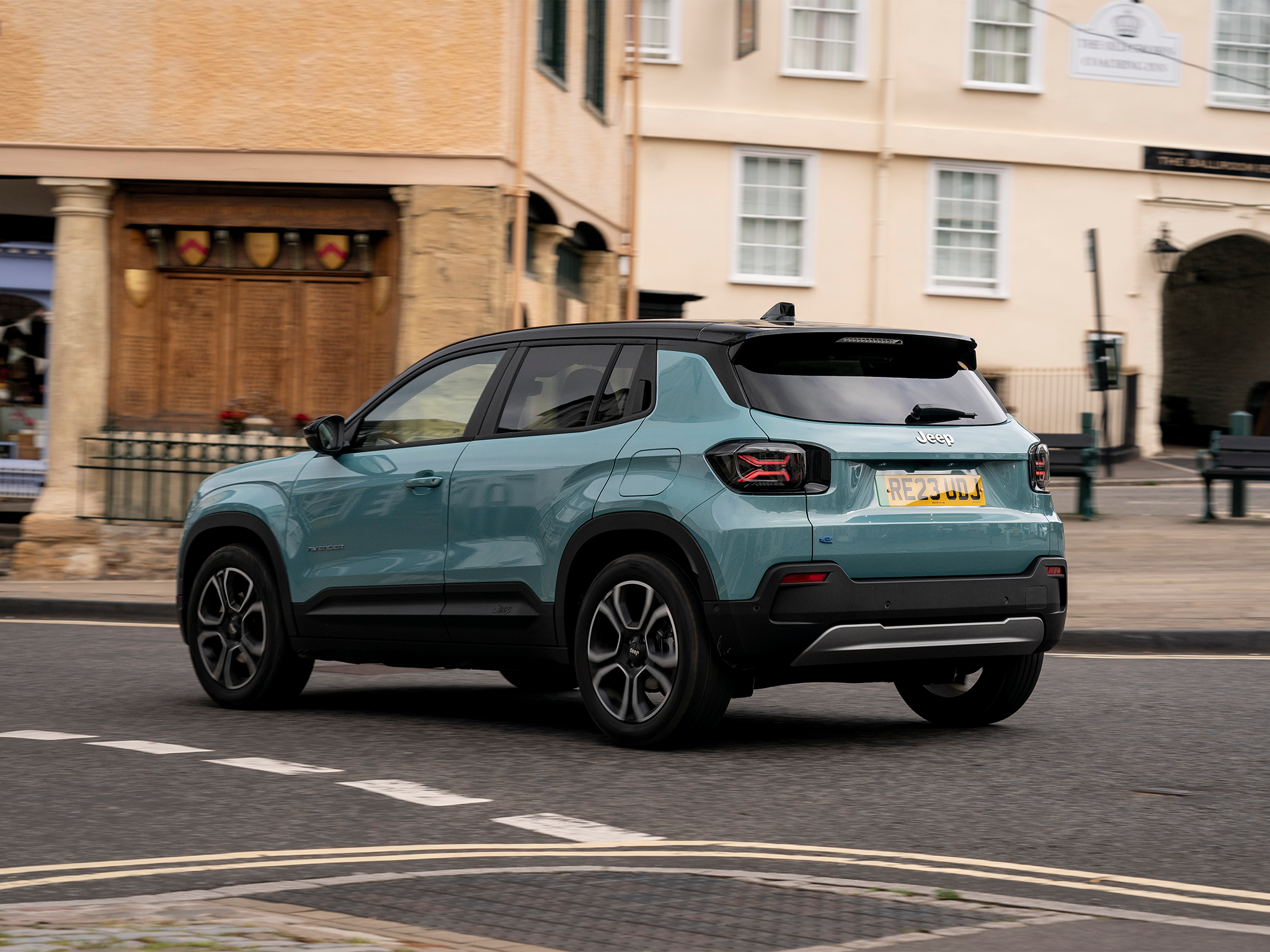
Independent rating: 7/10
- Pros: Characterful design, easy to drive, well priced
- Cons: Small in the second row, feels slightly underpowered, cheap interior plastics
Jeep Avenger specs
- Dimensions: 4,084mm x 1,797mm x 1,536mm
- Price range: £34,999 to £38,899
- Battery size: 54 kWh
- Maximum claimed range: 248 miles
- Miles per kWh (claimed): 4.0
- Maximum charging rate: 100kW
It might look like a big, off-roading 4x4 but the Avenger is actually pretty small. Instead of a mud-plugging SUV it’s a compact city car with bags of character and Tonka toy styling that fans of the Jeep brand will love. It shares the same electric platform as the Peugeot e-2008, Vauxhall Mokka and Citroen e-C4, but clothes it in a body that is distinctly Jeep, and even capable of a little bit of light off-roading, despite only being front-wheel-drive. If you need more, a dual-motor, all-wheel-drive Avenger will be along later.
We like the practicality of the Avenger, inside and out. The interior has plenty of thoughtful storage options and there’s a decent amount of tech in flagship Summit trim level, including wireless phone charging and LED lights all round.
Read our full Jeep Avenger review
A quoted range of up to 250 miles should be enough for most drivers, and at 100 kW the Jeep charges fairly quickly for a car that starts at about £35,000. Although cleverly designed, the interior has slightly too many hard and scratchy plastics to be perfect. It’s also a bit cramped in the second row, and can feel a little underpowered on quicker roads.
That said, we’re still big fans of the Avenger’s characterful design, how easy it is to drive – it really is one of those cars that puts a smile on your face after just a few miles behind the wheel – and the sub-£40,000 price tag.
7. Abarth 500e: From £29,985, Abarthcars.co.uk
Best: For fun
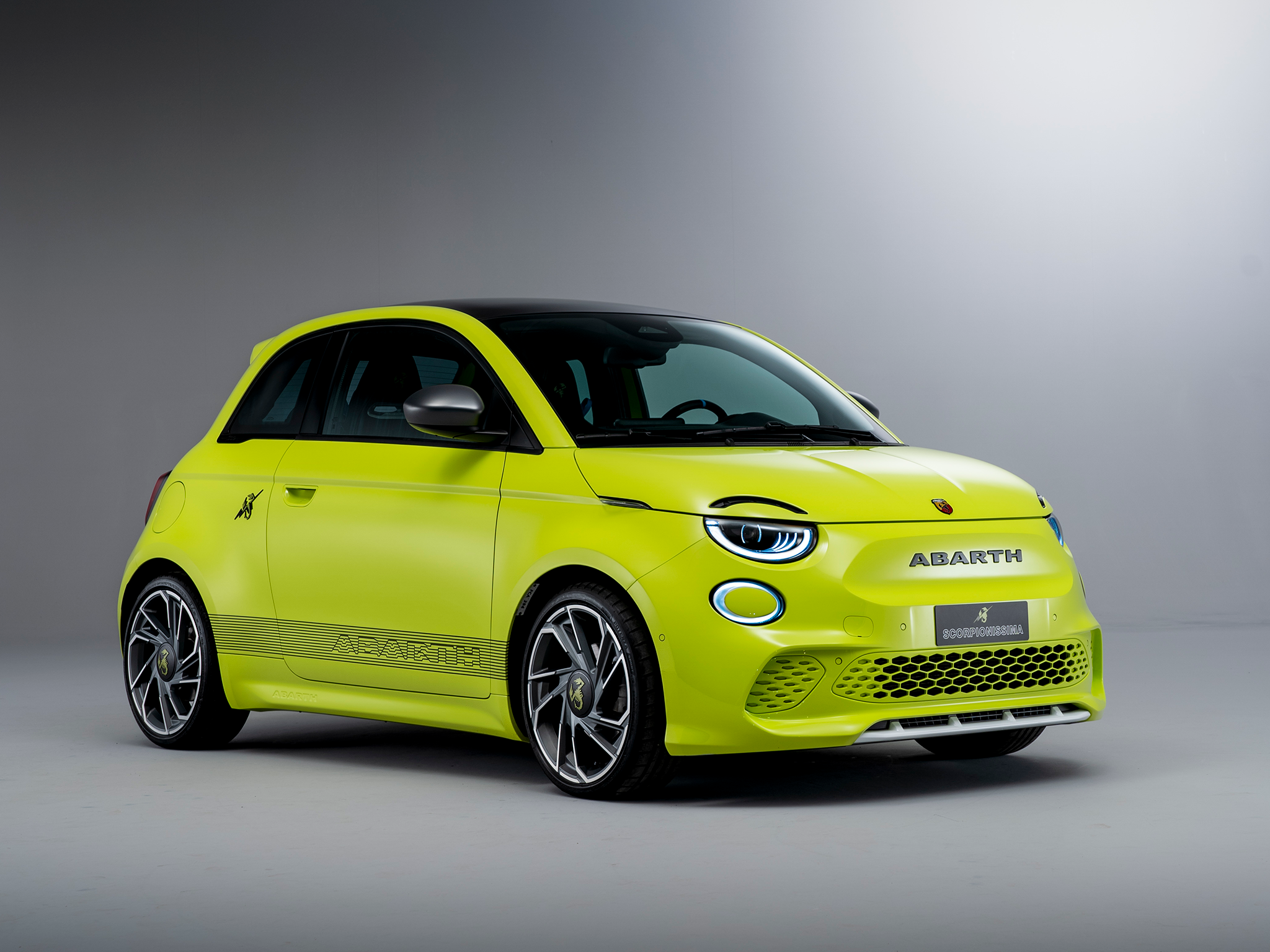
Independent rating: 7/10
- Pros: Fun to drive, funky looks
- Cons: Cramped cabin, limited range
Abarth 500e specs
- Dimensions: 3,673mm x 1,682mm x 1,518mm
- Price range: £29,985 to £38,195
- Battery size: 42.2 kWh
- Maximum claimed range: 150-164 miles
- Miles per kWh (claimed): 3.6
- Maximum charging rate: 84 kW
Although not an objectively great electric car on paper – you can blame the slow charging speed, cramped cabin and small battery for that – the Abarth 500e has a sense of fun that few EVs can match.
It comes from the performance division of Fiat and is available in hard-top and convertible forms – the latter still a rarity with its ability to provide open-air EV motoring. It has more power than the Fiat, with enough punch to feel quick and chassis modifications that make it more responsive in the corners, but without ruining comfort.
Read our full Abarth 500e review
Those changes aside, the Abarth is still physically very similar to the Fiat 500e, so the rear seats remain cramped and clamouring into them is still a faff. It’s also fairly range-limited, at about 150 miles if you’re careful, and the charge speed isn’t great for speedy top-ups.
But we challenge you not to smile when you’re behind the wheel, thanks to the Abarth’s ramped up performance, funky styling and artificial sound generator that all help give it a cheeky, playful character that few EVs can get close to. The new Mini Cooper E is a worthy rival and has extra cabin space, but it costs more.
8. BYD Dolphin: From £30,205, BYD.com
Best: For kit
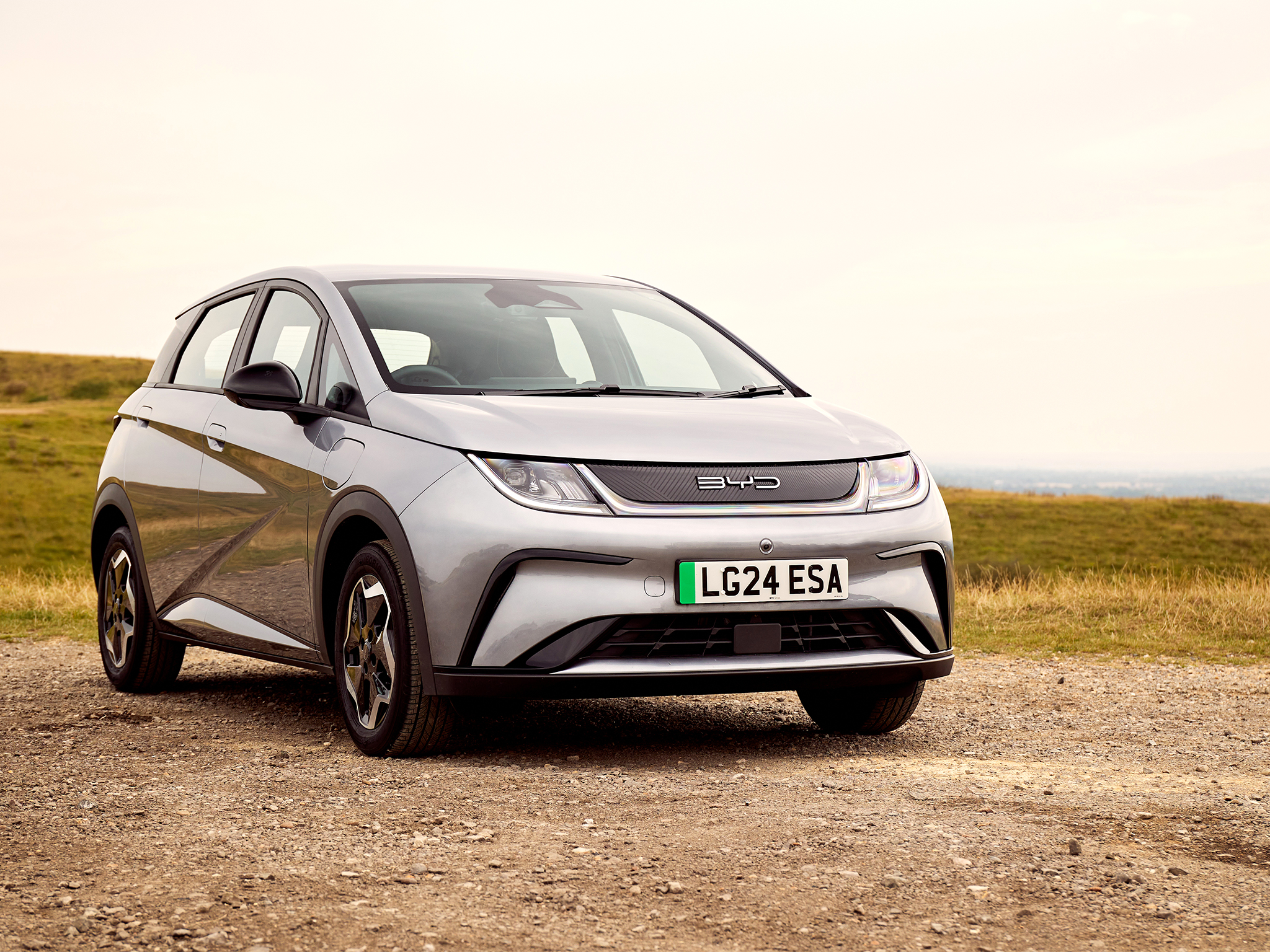
Independent rating: 7/10
- Pros: Well-equipped, decent range, spacious and nicely designed interior
- Cons: Active model is underpowered, relatively slow charging, forgettable exterior design
BYD Dolphin specs
- Dimensions: 4,290mm x 1,770mm x 1,570mm
- Price range: £30,205 to £31,695
- Battery size: 44.9 to 60.4 kWh
- Maximum claimed range: 195 to 265 miles
- Miles per kWh (claimed): 3.9 to 4.08
- Maximum charging rate: 65 to 88 kW
Vying with Tesla for the title of world’s largest electric car maker, Chinese firm BYD recently brought its Dolphin to the UK. This is a compact but surprisingly well-equipped five-door family car with a good range and a price that starts just over £25,000. The exterior styling is on the forgettable side, but the interior is nicely designed, with good use of soft fabrics to make it feel less spartan than some rivals, and an attention-grabbing display that rotates electronically between portrait and landscape.
There’s a good amount of kit included as standard, but we recommend you pay the extra £1,000 for the Boost trim option, as the entry-level Active feels a little underpowered.
Read our full BYD Dolphin review
The Dolphin rides well and is pleasant to drive, with more refinement than you might expect from a car at this price range. It’s far from sporty, of course, but for the vast majority of buyers that doesn’t matter one bit. The larger battery of the Comfort and Design trims takes the claimed range up to a truly impressive 265 miles, but fairly slow charging means you’ll see no more than 88 kW when you plug into a public charger.
Inside you’ll find more rear legroom than in an electric Mini Cooper or Vauxhall Corsa, and every version of Dolphin comes with electrically-adjustable front seats. Plus there’s Apple CarPlay and Android Auto as standard, so you can spend less time dealing with BYD’s fiddly infotainment system.
9. Renault Zoe: From £29,995, Renault.co.uk
Best: For used buy
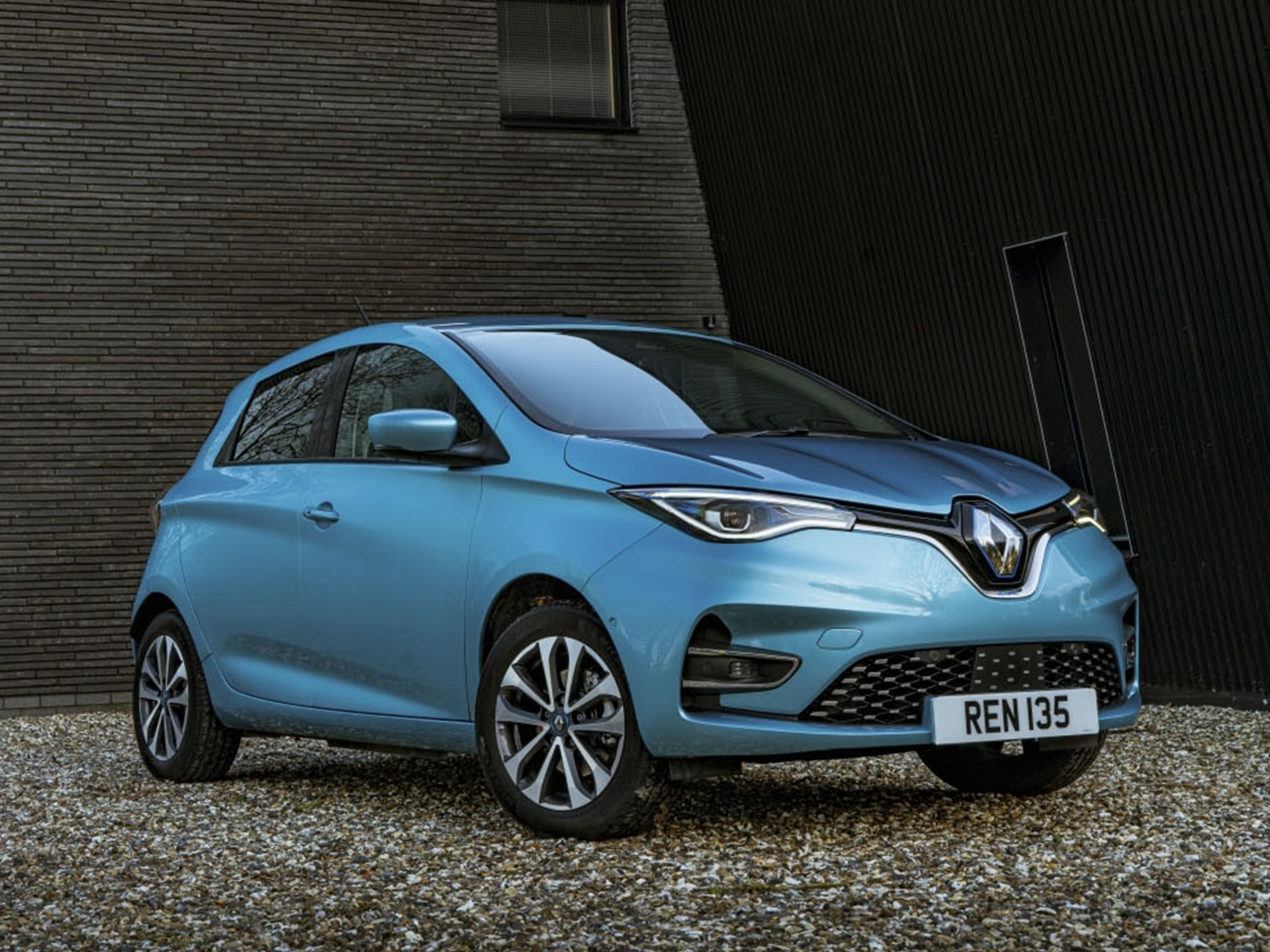
Independent rating: 6/10
- Pros: Easy to drive, good range, excellent second-hand value
- Cons: Poor crash safety rating, cramped rear seats, slow charge speed
Renault Zoe specs
- Dimensions: 4,087mm x 1,787mm x 1,562mm
- Price range: £29,995 to £31,995 (when new)
- Battery size: 52 kWh
- Maximum claimed range: 245 miles
- Miles per kWh (claimed): 4.6
- Maximum charging rate: 46 kW
Although no longer in production, the Renault Zoe is a good compact EV with an impressive range and a good amount of kit when treated to the top trim level by its first owner. Some models include heated seats and a rear view camera, while all second-generation examples come with support for Apple CarPlay and Android Auto.
Late examples with the larger 52 kWh battery had a claimed range of over 200 miles, giving them plenty of real-world stamina. The Zoe charges fairly slowly, however, with a 10-80 percent top-up likely to take around 50 minutes, since its charge rate is limited to 46 kW.
Read our full Renault Zoe review
A second-hand Zoe might not be enough as your only car, but if you need a second vehicle for school runs, supermarket shops and train station commutes, the little Renault represents fantastic value, with used examples now starting at under £4,000. Even much newer models are now around the £10,000 mark.
All that lets the Zoe down is a crash safety rating that was downgraded late in the car’s life, partially owing to its lack of modern crash-avoidance technology.
10. Ora 03: From £31,995, GWMora.co.uk
Best: For range
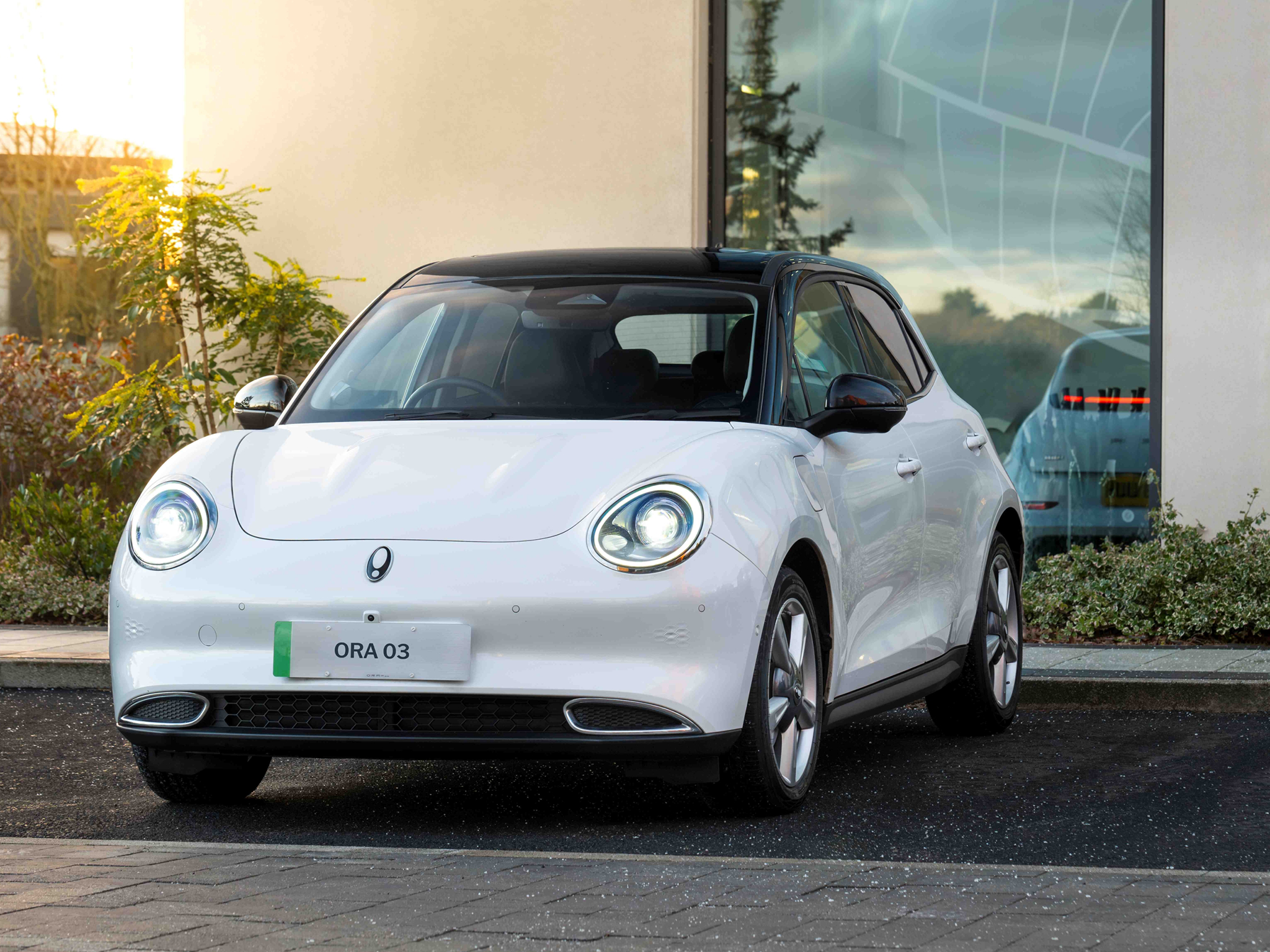
Independent rating: 6/10
- Pros: Great deals makes it super-cheap, funky looks, well made
- Cons: No fast charging, small boot, fussy ride
Ora O3 specs
- Dimensions: 4,235mm x 1,825mm x 1,603mm
- Price range: £31,995 to £34,995
- Battery size: 48 kWh to 63 kWh
- Maximum claimed range: 260 miles
- Miles per kWh (claimed): 3.77
- Maximum charging rate: 64 kW
Briefly known as the Ora Funky Cat, the 03 might have lost the most distinctive name of any EV on sale, but it’s still a strong option when it comes to well-priced electric cars. The £32,000 price tag only tells part of the Ora 03’s story, since it can be picked up for just £130 a month.
We’re drawn to the Ora’s funky design – although be warned, as it’s actually quite a big larger than it looks in photos – and we found it to be well made during our test drive.
However, while it’s an EV that will make a lot of sense to many drivers on a budget, the Ora 03 doesn’t offer fast charging, and is limited to a maximum charge rate of just 64 kW, so it isn’t best suited to longer journeys with speedy pit stops. We also feel the 03 has a small foot and the fide can feel fussy over uneven road surfaces.
11. Peugeot e-208: From £28,200, Peugeot.co.uk
Best: For quality
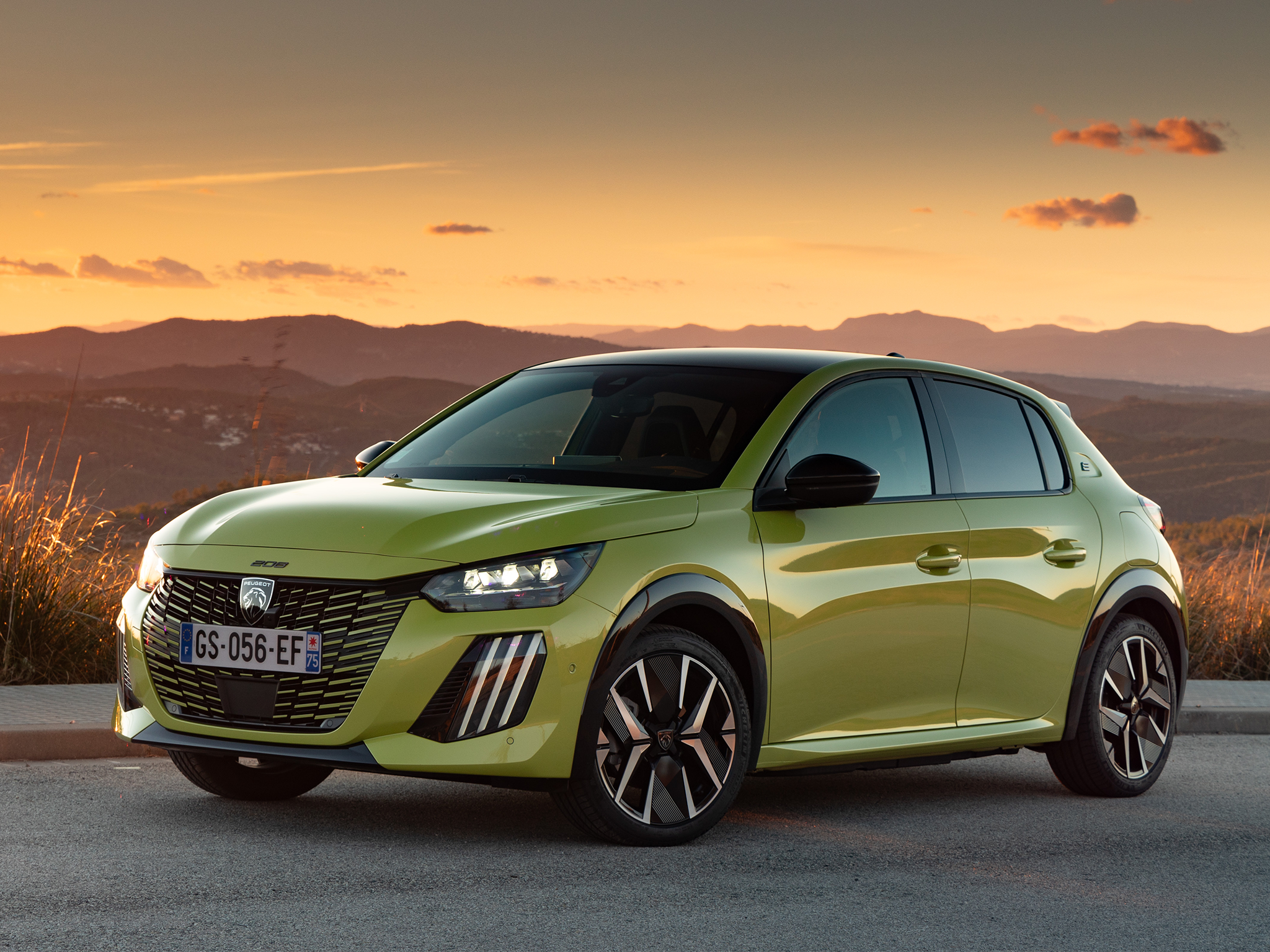
Independent rating: 7/10
- Pros: Smart interior, good energy efficiency, decent value
- Cons: ‘Marmite’ ergonomics, average range, tight back-seat space
Peugeot e-208 specs
- Dimensions: 4,055mm x 1,745mm x 1,430mm
- Price range: £28,200 to £32,850
- Battery size: 50 to 51 kWh
- Maximum claimed range: 248 miles
- Miles per kWh (claimed): 3.9 to 4.4
- Maximum charging rate: 100kW
Although it has been around since 2019, a recent update has kept the e-208 looking fresh. It’s a smart-looking compact EV with a nice interior, good energy efficiency (you can thank the compact size for that) and decent value.
Some drivers might be unsure about the Peugeot ergonomics, complete with the brand’s compact steering wheel and angular cabin surfacing, but we think it gives the e-208 a smart, distinctive style.
Read our full Peugeot e-208 review
The e-208’s battery range is pretty good, and especially so with the newer 51 kWh option; with that you’ll see 200 miles or so in real-world conditions, which should be enough for many drivers and is great for a compact car like this. Of equal importance is how the Peugeot supports charging speeds of up to 100 kW – well above some of its similarly-sized rivals, and more even than the latest generation of pricier Mini Cooper SE.
Despite its advancing years (in EV terms, at least) the e-208 still feels fresh, thanks to its bold interior that gives the driver a feelgood factor that’s sometimes hard to find in this sector of the market. We also found it easy and enjoyable to drive, and it feels right at home in any urban setting.
FAQs
What’s the smallest electric car in the UK?
The smallest electric car in the UK is the Citroen Ami at just 2.4m long. The super-compact EV is technically a quadricycle, and its limited range, speed and all-round impracticality makes it difficult to recommend as anything other than a fun novelty.
Is it worth buying a small EV?
It depends on how you plan to use your car and how big your family is, but today’s best small EVs are practical and can offer serious long-term savings on running costs. Because they’re more compact than the more popular mid-sized SUV format, they’re ideal for urban driving where they’re easy to park and manoeuvre.
Why trust us
Our team of motoring experts have decades of experience driving, reviewing and reporting on the latest EV cars, and our verdicts are reached with every kind of driver in mind. We thoroughly test drive every car we recommend, so you can be sure our verdicts are honest, unbiased and authentic.
Verdict: The best small electric cars
Our favourite small electric car right now is the Volvo EX30. It looks fantastic and will give every owner the feeling that they’re behind the wheel of a premium car. It also pairs lovely Scandinavian design with a well-resolved ride, great build quality and a good range, with fast charging too.
Although the dual-motor version is properly quick – the quickest Volvo production car ever, in fact – we strongly suggest readers go for the single-motor car, but make sure they upgrade to the bigger battery for a claimed range of almost 300 miles. In the real world that’ll be more like 200 to 250, but that’s still impressive for the small Volvo.
The little EX30 isn’t perfect; we wish it had physical controls for steering wheel and mirror adjustment, but the rest of the technology works well, thanks to Google’s Android Automotive operating system. This has integrated Spotify for music streaming, Google Assistant for voice control, and Google Maps for seamlessly navigating via charge stations.
Second and third places go to the Dacia Spring and Mini Cooper respectively. The former is seriously cheap at just £14,995, while the latter is packed full of character and properly fun to drive.
Join our commenting forum
Join thought-provoking conversations, follow other Independent readers and see their replies
Comments










Bookmark popover
Removed from bookmarks